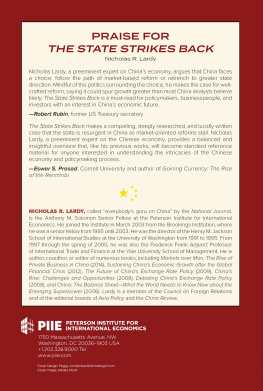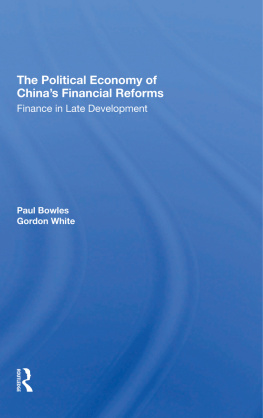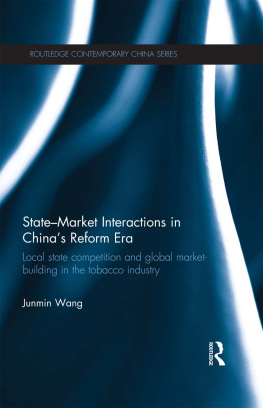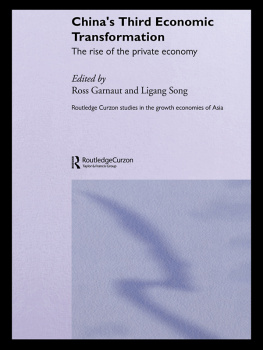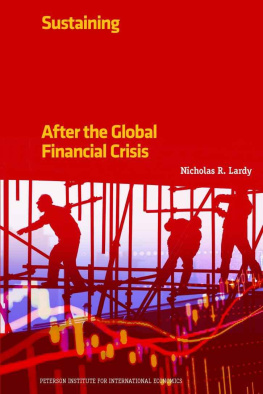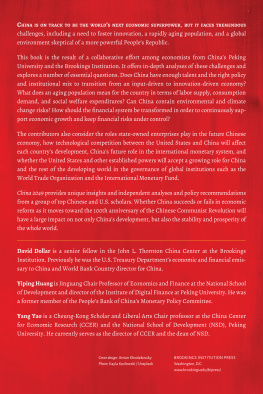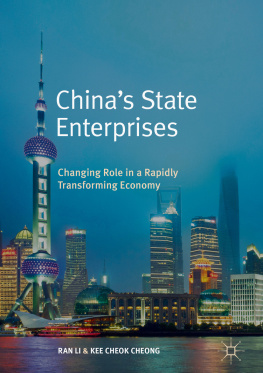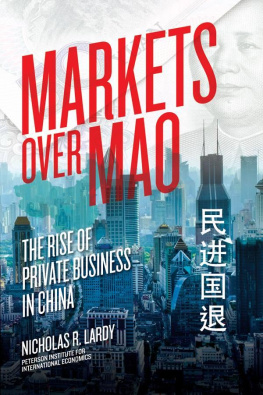THE
STATE
STRIKES
BACK

THE END OF
ECONOMIC REFORM
IN CHINA?
NICHOLAS R. LARDY
THE
STATE
STRIKES
BACK

THE END OF
ECONOMIC REFORM
IN CHINA?
Peterson Institute for International Economics
Washington, DC
January 2019
Nicholas R. Lardy, called everybodys guru on China by the National Journal, is the Anthony M. Solomon Senior Fellow at the Peterson Institute for International Economics. He joined the Institute in March 2003 from the Brookings Institution, where he was a senior fellow from 1995 until 2003. He was the director of the Henry M. Jackson School of International Studies at the University of Washington from 1991 to 1995. From 1997 through the spring of 2000, he was also the Frederick Frank Adjunct Professor of International Trade and Finance at the Yale University School of Management. He is author, coauthor, or editor of numerous books, including Markets over Mao: The Rise of Private Business in China (2014), Sustaining Chinas Economic Growth after the Global Financial Crisis (2012), The Future of China Exchange Rate Policy (2009), Chinas Rise: Challenges and Opportunities (2008), Debating Chinas Exchange Rate Policy (2008), and China: The Balance SheetWhat the World Needs to Know Now about the Emerging Superpower (2006). Lardy is a member of the Council on Foreign Relations and of the editorial boards of Asia Policy and the China Review.
PETERSON INSTITUTE FOR INTERNATIONAL ECONOMICS
1750 Massachusetts Avenue, NW Washington, DC 20036-1903 + 1.202.328.9000 www.piie.com
Adam S. Posen, President Steven R. Weisman, Vice President for Publications and Communications
Cover Design by Peggy Archambault Printing by Ironmark
Copyright 2019 by the Peterson Institute for International Economics. All rights reserved. No part of this book may be reproduced or utilized in any form or by any means, electronic or mechanical, including photocopying, recording, or by information storage or retrieval system, without permission from the Institute.
For reprints/permission to photocopy please contact the APS customer service department at Copyright Clearance Center, Inc., 222 Rosewood Drive, Danvers, MA 01923; or email requests to:
Printed in the United States of America
21 20 19 5 4 3 2 1
Library of Congress Cataloging-in-Publication Data
Name: Lardy, Nicholas R., author. Title: The state strikes back : the end of economic reform in China? Nicholas R. Lardy. Description: Washington, DC : Peterson Institute for International Economics, [2019] Includes bibliographical references and index.
Identifiers: LCCN 2018039390 (print)
LCCN 2018056104 (ebook)
ISBN 9780881327373 (paper)
ISBN 9780881327380 (ebook)
Subjects: LCSH: ChinaEconomic policy2000 | ChinaEconomic conditions2000
Classification: LCC HC427.95 (ebook) | LCC HC427.95 .L369 2019 (print) | DDC 338.951dc23.
This publication has been subjected to a prepublication peer review intended to ensure analytical quality. The views expressed are those of the author. This publication is part of the overall program of the Peterson Institute for International Economics, as endorsed by its Board of Directors, but it does not necessarily reflect the views of individual members of the Board or of the Institutes staff or management.
The Peterson Institute for International Economics is a private nonpartisan, nonprofit institution for rigorous, intellectually open, and indepth study and discussion of international economic policy. Its purpose is to identify and analyze important issues to make globalization beneficial and sustainable for the people of the United States and the world, and then to develop and communicate practical new approaches for dealing with them. Its work is funded by a highly diverse group of philanthropic foundations, private corporations, and interested individuals, as well as income on its capital fund. About 35 percent of the Institutes resources were provided by contributors from outside the United States. A list of all financial supporters is posted at https://piie.com/sites/default/files/supporters.pdf.
Contents
Tables
Box
Figures
Preface
The range of views expressed on the likely future pace of Chinas economic growth is stunningly wide. Some contend that in terms of common prices Chinas GDP already exceeds that of the United States and project that it will soon overtake the United States even measured at market prices. Others are equally confident that Chinas growth over the next decade or two will slow to an average rate of only two to three percent, a pace not much above the likely trajectory of the United States. Both camps, and many in between, treat their projections as predetermined by great forceswhether the oft-mentioned but dubious middle-income trap pushing the trend relentlessly down, or the sheer size and nature of Chinas global presence keeping the growth rate up high.
Rightly and powerfully, Nicholas Lardy argues that Chinas economic trajectory is far from predestined. Instead, the Chinese states policy choices will be the major determinant of its future growth. The slowdown of recent years is not primarily the natural slowing of what is now a more mature, upper middle-income country. It reflects the increasing drag of state companies on economic growth and the burgeoning misallocation of resources by Chinas financial sector. If Chinas leadership continues to opt for state-led growth in pursuit of greater economic and political control, Chinas growth trend would slow further. Alternatively, if Chinas leadership goes back to a market-oriented reform program, that would boost Chinas trend growth to well above the pace of recent years. In this study, Lardy not only demonstrates the economic costs to Chinaand to the worldof the state having struck back since 2011 but he also outlines a path that would sustainably raise Chinas growth rate. The economic benefits to China and the world would be enormous, but it would require the reduction of some control reimposed by the Chinese state over the economy.
Any longer-term projection must be based on a deep understanding of the contingent factors and policy choices that account for the recent slowdown in Chinas growth, from the double-digit pace in the decade through 2011 to the 6 to 7 percent range since that time. Lardys analysis shows that a main driving factor was the turn away from the market orientation that guided economic reform for more than three decades starting in 1978. Market-oriented reform based on private firms was wildly successful. By 2012 these firms accounted for 70 percent of Chinas output, up from almost nothing in 1978. But a visible change in strategy, in favor of state led growth, accelerated under the leadership of party Chairman Xi Jinping starting in 2012.
Xi came into office endorsing wide-ranging market-oriented economic reform but he quickly abandoned this design in favor of a more statist approach. This was evident in more aggressive, detailed industrial policies that directed a growing flow of resources to priorities identified by the state; mergers of already large state companies to form even larger conglomerates that reduced competition in many critical sectors; a redirection of credit away from far more productive private firms to underperforming state companies; and an undermining of private property rights that further reduced private investment. But state-led growth clearly has failed in economic terms. The productivity of state firms in industry and services is now two-thirds and two-fifths lower, respectively, than a decade ago, while the productivity of private firms has continued to increase.
Next page
